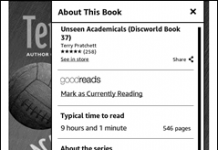 Recently the folks at Amazon have been put into a vicious corner. They are trapped between a growing consumer base who they are diligently serving and a recalcitrant supplier who wants to redraw the balance of power. Make no mistake folks the “balance of power” in e-book pricing is finally being firmly challenged by a major publisher. As Chris Meadows wisely reminded us Amazon is currently trapped in an economic death funnel. The only way forward is through Macmillan and there are literally a million plus people pushing Amazon further into this quagmire. If I were Jeff Bezos I would be thinking about whether or not I can hold out much longer. Windowing releases and/or charging Amazon exorbitant prices is one thing but outright bullying is another. Unfortunately, for e-book aficionados our window to prevent the raping of e-books is closing in on us.As Chris reminded us in Economics there is something known as resale price maintenance in which a supplier dictates terms to a distributor. Where he left off I will begin by highlighting two concepts, one known as Cartelization, the other Path Dependency. Amazon is being pressured by publishers who are slowly circling their wagons and deciding to either alienate or ostracize Kindlers. Their power as gate keepers is being threatened by the rapid growth of e-books as well as self-publishing with their $9.99 and under equilibrium price. For months a divided yet spirited Kindle community has fought a good fight and emboldened Amazon into actually adhering to its initial “low price-high volume” model. But like the Bible’s warrior Samson this remarkable duo has a glaring weakness: their insatiable need for high quality books.
Recently the folks at Amazon have been put into a vicious corner. They are trapped between a growing consumer base who they are diligently serving and a recalcitrant supplier who wants to redraw the balance of power. Make no mistake folks the “balance of power” in e-book pricing is finally being firmly challenged by a major publisher. As Chris Meadows wisely reminded us Amazon is currently trapped in an economic death funnel. The only way forward is through Macmillan and there are literally a million plus people pushing Amazon further into this quagmire. If I were Jeff Bezos I would be thinking about whether or not I can hold out much longer. Windowing releases and/or charging Amazon exorbitant prices is one thing but outright bullying is another. Unfortunately, for e-book aficionados our window to prevent the raping of e-books is closing in on us.As Chris reminded us in Economics there is something known as resale price maintenance in which a supplier dictates terms to a distributor. Where he left off I will begin by highlighting two concepts, one known as Cartelization, the other Path Dependency. Amazon is being pressured by publishers who are slowly circling their wagons and deciding to either alienate or ostracize Kindlers. Their power as gate keepers is being threatened by the rapid growth of e-books as well as self-publishing with their $9.99 and under equilibrium price. For months a divided yet spirited Kindle community has fought a good fight and emboldened Amazon into actually adhering to its initial “low price-high volume” model. But like the Bible’s warrior Samson this remarkable duo has a glaring weakness: their insatiable need for high quality books.
Traditional publishers excel more than anyone else at meeting this demand when they avoid the “normalization of deviance” concept which I covered in an earlier piece. Macmillan thinks that it has finally figured out how to get Kindlers to tow its line permanently: by completely cutting them off. Every boycotter’s nightmare scenario would be that other publishers may slowly follow suit, thus creating a tacit -soft- cartel. The only possible outcome of this –barring any legal intervention- would be the Amazonian equivalent of a Faustian bargain in which Amazon does as the publishers demand in order to keep the Kindle platform alive. This is where Path Dependency could kick in and it would create a harrowing future.
Presently Amazon constitutes 90% of the e-book market, and dictates what other distributors do. It established $9.99 pricing as a result of wisely listening to its passionate customers and other distributors followed suit. It has also introduced something that few other major e-book retailers have done which is to allow its self-published authors a chance to sell DRM free e-books, possibly opening the door to a future without DRM. Publishers over the next couple of months will nervously hedge their bets by backing Apple’s iPad and its outrageous pricing/DRM but they are not above kneecapping one of Apple’s largest competitors. If Macmillan wins I can’t help but picturing these intellectual ruffians, these maintainers of the undemocratic slush pile, sitting around like Orwell’s pigs re-establishing the cycle of domination that Kindlers have railed so hard against. Kindlers you must not go quietly into the night.

































I’d watched the Amazon-Macmillan contretemps with great interest and generally sympathized with Amazon’s position. The Macmillan gambit, though, is not the only pressure ploy currently in play.
I understand that ePub with the prevailing DRM (B&N, Sony) won’t be licensed by Adobe to anyone who also uses the .mobi format (Amazon). I’d like see Amazon adopt ePub as their main or alternate format, but apparently this is not currently possible. They could, of course, use ePub with a DRM method of their own like Apple seems to be doing. Adobe might also be preventing Amazon from using a more powerful way to display .pdf files. Adobe is very quiet in public but seems to be playing an unpleasant game in the background. Steve Jobs had some strong comments about them late last week.
Google, too, is playing a major power game with the books they’ve scanned. While their public domain books can be downloaded in a variety of formats, their control of books in the gray copyright area makes me nervous.
Macmillan is ‘cutting off’ Amazon customers? Huh? I thought Amazon had agreed to Macmillan’s terms.
Apple’s […] outrageous pricing/DRM? We virtually don’t know anything about Apple’s pricing and DRM. Steve Jobs said that Apple’s pricing would be on the same level as Amazon’s. And as we don’t know anything about the DRM that Apple will impose on its ebooks, why would it be more outrageous than Amazon’s? Or Adobe’s for that matter?
@GJN: Isn’t the format war bad for publishers and authors? For example. To really have all of the flexibility that I take advantage of with print, I would need to have both a Kindle and a Sony. But if I didn’t have to spend USD 300 or thereabouts for an additional device, I’d have USD 300 to spend on content. I don’t really lend books, since I found that I kept not getting them back — but I’d like to be able to use the library for certain titles that I planned to read right away and only once; or to see if I like a particular author or series.
It just seems insane to need two devices for the two purposes. I don’t need a second, special ‘library DVD compatible’ DVD player to view DVD’s I’ve checked out of the library. The way library e-book lending works, is a lot like print. One copy per user. If a copy is checked out, it is unavailable for download. What could the problem possibly *be*? If e-book prices are going to be comparable to print (for material that we will not own), I want to be able to ‘try before I buy’ at my local library, just like I do in the print world. A sample chapter here & there is only barely better than nothing.
At this point, if I were working in the industry, I’d want to ride the current wave of attention and emotion being devoted by the public mind to *reading*, which — as I know many recall — is *on the decline*. Anything that encourages people to read more is a good thing, but nothing that’s happening in the industry right now is going to attract new customers to the book world as a source of fun and enlightenment.
In the end, of course, is the fact that no-one needs to pay for a book again, if they get annoyed enough.
Might not be able to find some titles, but there will be no shortage, with more available every day.